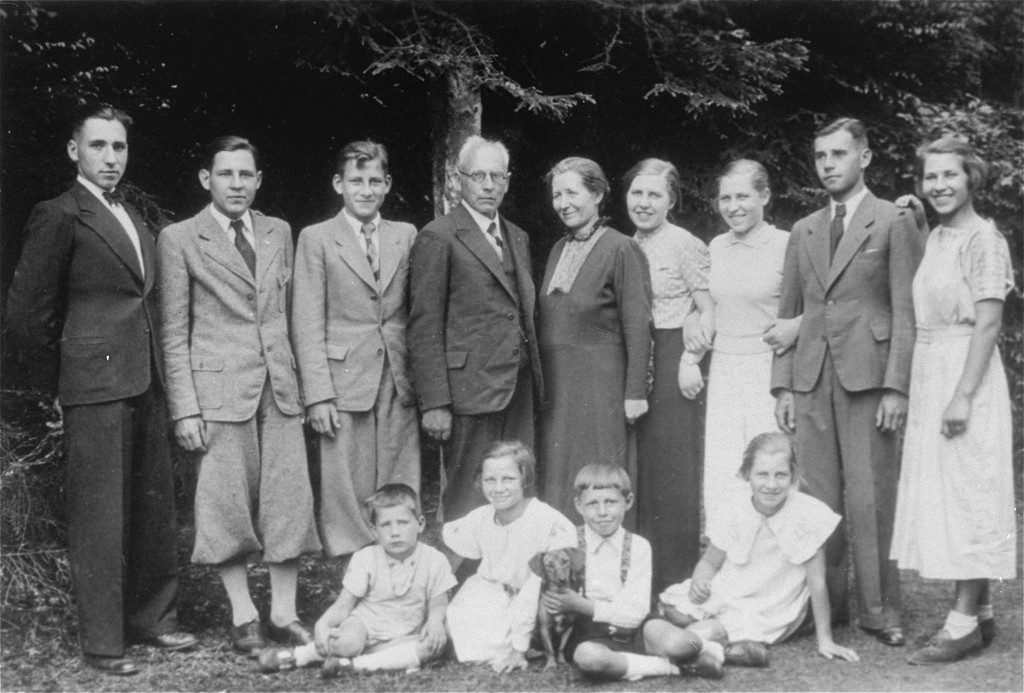
Nazi Persecution of Jehovah's Witnesses
Jehovah's Witnesses were subjected to intense persecution under the Nazi regime. Nazi leaders targeted Jehovah's Witnesses because they were unwilling to accept the authority of the state, because of their international connections, and because they were strongly opposed to both war on behalf of a temporal authority and organized government in matters of conscience.
Within months of the Nazi takeover, regional governments, primarily those of Bavaria and Prussia, initiated aggressive steps against Jehovah's Witnesses, breaking up their meetings, ransacking and then occupying their local offices. By April 1, 1935, the Reich and Prussian Minister of the Interior ordered the responsible local officials to dissolve the Watchtower Society.
Many actions of Jehovah's Witnesses antagonized Nazi authorities. While Witnesses contended that they were apolitical and that their actions were not anti-Nazi, their unwillingness to give the Nazi salute, to join party organizations or to let their children join the Hitler Youth, their refusal to participate in the so-called elections or plebiscites, and their unwillingness to adorn their homes with Nazi flags made them suspect. A special unit of the Gestapo (secret state police) compiled a registry of all persons believed to be Jehovah's Witnesses. Gestapo agents infiltrated Bible study meetings. While Jehovah's Witnesses as such were not banned, many of the activities which were basic to the exercise of the faith increasingly came under attack. Above all, the authorities sought to interdict the distribution of printed materials, produced locally or smuggled in from outside the country in large quantities, which in the eyes of the Nazis were clearly subversive.
When Germany reintroduced compulsory military service in March 1935, the conflict with the Witnesses escalated. For refusing to be drafted or perform military-related work, and for continuing to meet illegally, increasing numbers of Jehovah's Witnesses were arrested, tried by judicial authorities and incarcerated in prisons and concentration camps.
By 1939, an estimated 6,000 Witnesses (including some from Austria and Czechoslovakia) were detained in prisons or camps. Others fled Germany, continued their religious observance in private, or ceased to observe altogether. Some Witnesses were tortured in attempts to make them sign declarations renouncing their faith, but few capitulated to this pressure.
In the concentration camps, all prisoners wore markings of various shapes and colors so that guards and camp officers could identify them by category. Jehovah's Witnesses were marked by purple triangular patches. Even in the camps, they continued to meet, pray, and seek converts. In the Buchenwald concentration camp, they set up an underground printing press and distributed religious tracts.
Conditions in Nazi camps were harsh for all inmates. Many prisoners died from hunger, disease, exhaustion, exposure to the cold, and brutal treatment. Incarcerated Jehovah's Witnesses were sustained by the support they gave each other and by their belief that their suffering was part of their work for God. Individual Witnesses astounded guards with their refusal to conform to military-type routines like roll call or roll bandages for soldiers at the front. At the same time, camp authorities considered Witnesses to be relatively trustworthy because they refused to escape or physically resist their guards. For this reason, Nazi camp officers and guards often used Witnesses as domestic servants.
Of the 25,000 to 30,000 Germans who in 1933 were Jehovah's Witnesses, an estimated 20,000 remained active through the Nazi period. The remainder fled Germany, renounced their faith, or confined their worship to the family. Of those remaining active, about half were convicted and sentenced at one time or another during the Nazi era for anywhere from one month to four years, with the average being about 18 months. At least 3,000 Jehovah's Witnesses were sent to concentration camps (this figure includes at least 200–250 Dutch, 200 Austrians, 100 Poles, and between 10 and 50 Belgians, French, Czechs, and Hungarians).
An estimated 1,000 German Jehovah's Witnesses died or were murdered in concentration camps and prisons during the Nazi era, as did 400 Witnesses from other countries, including about 90 Austrians and 120 Dutch persons. (The non-German Jehovah's Witnesses suffered a considerably higher percentage of deaths than their German co-religionists.) In addition, at least 273 Jehovah's Witnesses were sentenced to death by military courts for refusing military service were executed.
Critical Thinking Questions
- What might have influenced individual reactions to the persecution of this group?
- How did the treatment of Jehovah's Witness prisoners differ from the treatment of other targeted groups? How was it the same?
- Why do governments and ideologies target religious groups? How can this assault or intent be countered?